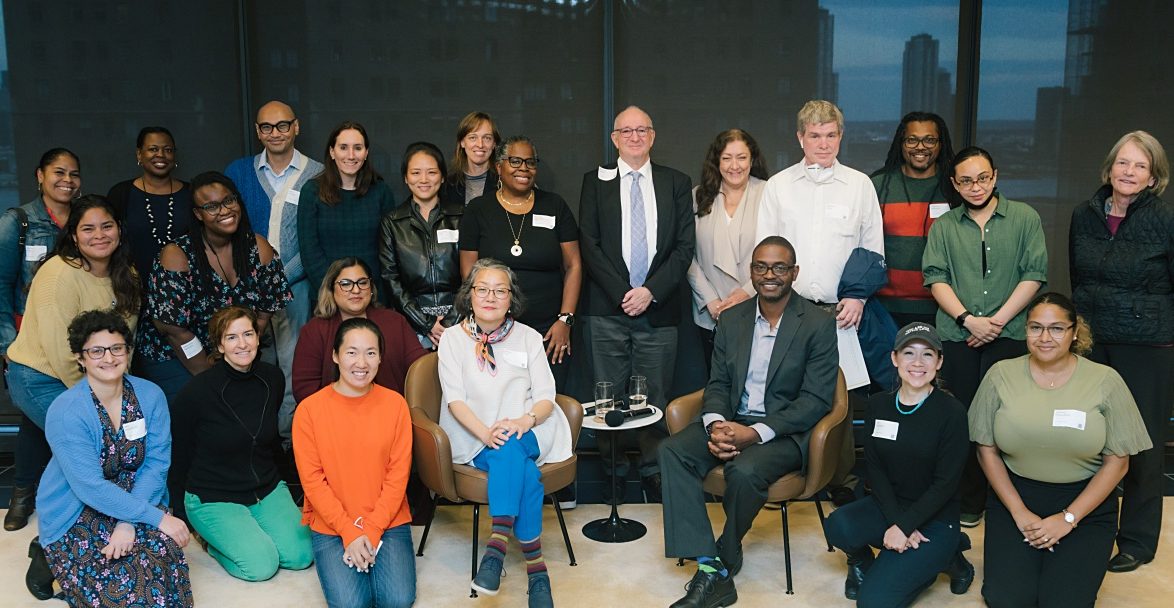Today’s Practitioners. Tomorrow’s Leaders.
With growing economic inequality, inadequate supply of affordable housing, broad gaps in educational achievement, and insufficient living wages, the work of our city’s robust nonprofit sector has never been more important.
It is critically important that tomorrow’s nonprofit executive directors and managers have the necessary knowledge and skills to guide their organizations in successfully addressing the challenges and opportunities facing New Yorkers.
The New York Community Trust Leadership Fellows program was created in 2015 in partnership with the Austin W. Marxe School of Public and International Affairs at Baruch College to address these issues. Upon completion of the program, Fellows will receive an executive certificate from the Office of Executive Programs of the Marxe School of Public and International Affairs.
Program Overview
Fellows will participate in 12 class sessions on Fridays from 9:00 a.m. to 4:00 p.m. They will also be expected to attend all of our Leadership Conversations, which are scheduled according to the needs of our Fellows and external audience.
All of the costs associated with the fellowship are underwritten by foundations. The program is effectively free for applicants and their organizations.
It features:
- A curriculum taught through the lens of real-world issues and trends
- Small group exercises using tools and strategies to address the particular challenges and/or opportunities faced by the nonprofit sector
- Leadership Conversations where fellows connect with nonprofit professionals, social justice practitioners, and government leaders
- The opportunity to have a minimum of four 1-hour meetings with a carefully selected mentor
We aim to provide a supportive and inclusive environment for communities of color and immigrants, and we encourage executive directors to consider nominating talented people of color and immigrants from their staff.
Eligibility
- You must be a mid-career nonprofit professional.
- You must have a minimum of 5 years of overall nonprofit experience.
- You must have a minimum of 3 years of managerial experience — this means managing people, projects, and budgets.
- Your organization must have received a grant from the New York Community Trust or the Fund for the City of New York within the last three years. Unfortunately, donor-advised grants are not eligible.
Spring 2025 Nomination Form Checklist
- Do I have approval from my organization to apply?
- Have I read through all the information on the Apply and FAQs pages?
- Have I been given a change project to work on at my organization?
Class Schedule
The schedule for the Spring 2025 cohort is listed below. Please note that all sessions are still subject to change at this time. Sessions for the 2025 calendar year will be held primarily at the New York Community Trust offices (909 3rd Ave, 22nd Floor, New York, NY 10022) with a few sessions at Baruch College (135 East 22nd Street, 3rd Floor, New York, NY 10010). All sessions run from 9:00 am to 4:00 pm.
- April 4
- April 11
- April 18
- April 25
- May 2
- May 9
- May 16
- May 23
- May 30
- June 6
- June 13
- June 20
- June 27
How Nominations Are Assessed
Nominations are scored on a 20-point scale.
Candidates are awarded a maximum of 5 points for each of the following categories:
Analytical Thinking: Does the candidate describe a challenge or issue that gives context to his/her proposed project?
Written Communication Skills: Is the candidate’s writing clear, convincing, and easy to understand?
Leadership Experience: Has the candidate held leadership roles with internal and external stakeholders at his/her organization? Does the candidate have leadership experience prior to his/her current organization?
Proposed Change Project: Is the proposed change project of front-burner importance to the organization?
Join Us
Spring 2025 nominations are open.
The deadline for nominations is end of day March 14, 2025.
All applicants must submit the form linked below. You will receive an email confirmation when you have successfully submitted.
If you have any questions, please contact us at info@fellows.gbtesting.us.
Frequently Asked Questions
Can my organization nominate more than one person?
Unfortunately, we can only accept one nomination from an organization per cohort cycle.
In simpler terms, this means that you can nominate Person A in the spring and Person B in the fall, but you cannot nominate both A and B in spring at the same time. You and your team will have to decide which individual is nominated per cycle.
Do I need to pay tuition to participate?
No. All costs associated with the fellowship are underwritten by our foundation partners. The program is free for applicants.
What time commitment do I have to make?
Each cohort runs for approximately three months in the Spring (April through June) and Fall (September through November) with about 30 fellows per cohort. Fellows will participate in approximately 12 sessions scheduled each Friday from 9:00 a.m. to 4:00 p.m. Fellows are also required to attend all Leadership Conversation panel discussions that provide a forum for engaging with leaders and change makers in the nonprofit sector from different organizations and foundations as well as all levels of local, city, and state government.
What if I have a conflict with the planned class times?
Please reach out to us at info@fellows.gbtesting.us to discuss this on a case-by-case basis. We will be happy to work with you.
Who fills out the nomination form?
The applicant who intends to join Leadership Fellows at The Trust should fill out the nomination form in their own words and their own writing.
What is the change project?
The “change project” is an initiative of front-burner importance for the organization, developed in consultation with the executive director or CEO of the organization. The initiative must address a potential leadership or managerial challenge or opportunity facing their organizations. Fellows draw on the knowledge gained in each session to develop their change project into potential initiative for implementation at their organization.
You can find change project samples from previously accepted fellows on our extended FAQs page.



